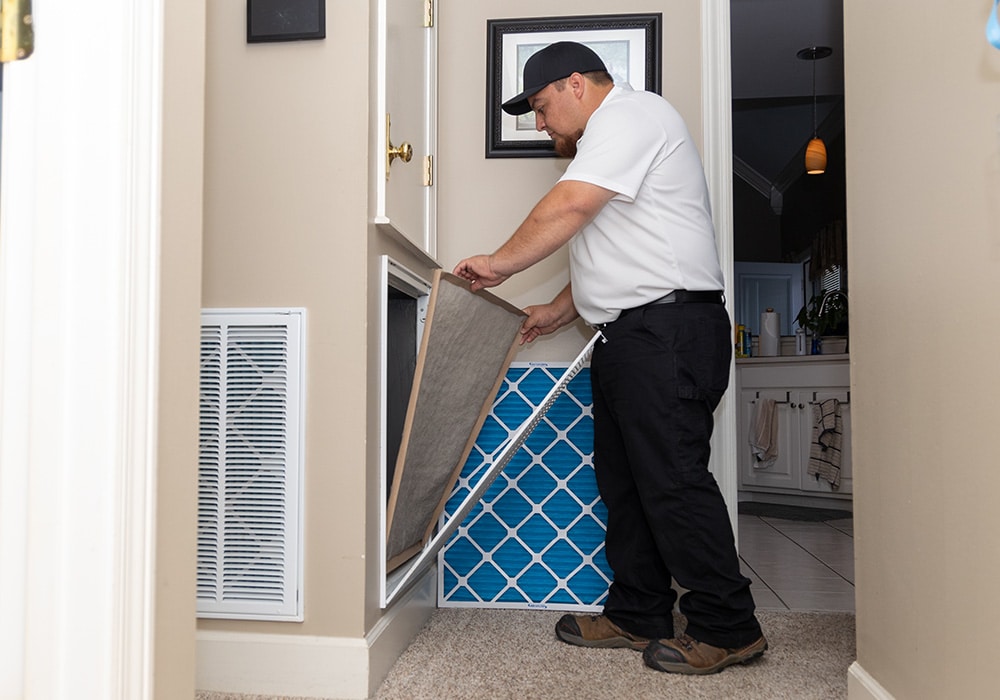One of the primary challenges in Western NC is the significant temperature fluctuations throughout the year. Summers can be sweltering, with temperatures soaring, while winters bring frigid temperatures and even snow in higher elevations.

5 Reasons to Avoid Covering Your HVAC System This Winter
There are a number of steps that you should take to winterize your Whittier, North Carolina home. However, covering up the outside condenser for your central HVAC system isn’t one of them. Although there are many high-quality and well-made HVAC covers on the market, these products often cause more problems than they prevent. The following are five reasons why using them is a bad idea.
1. Your Condenser Needs Ventilation
Even though your air conditioner’s outside component will remain dormant throughout the winter, it still needs ventilation. Plastic covers for these components have a tendency to trap moisture inside. Condensation that builds under an air conditioner’s cover will greatly increase the likelihood of rust formation. Even when HVAC condensers are subjected to rain, sleet, snow, and other forms of precipitation, constant airflow will keep their interior components dry.
Poor ventilation is even more likely to result in corrosion if you decide to fashion and use your own HVAC cover. Putting a tarp or a large piece of plastic over this component that lacks built-in ventilation is never a good idea. If you have a major storm coming your way and insist on using an HVAC cover, purchase one that was specifically designed for the air conditioner model you own. More importantly, be sure to remove this cover and let your condenser dry as soon as the storm has passed. HVAC condenser covers should never be used for more than two to three days at a time.
2. You Have to Remove Heavy Snow Loads
Although you don’t need to cover your air conditioner this winter, you do need to remove heavy snow loads and any built-up debris around its perimeter. Large covers hinder this essential maintenance. When you step outdoors to shovel your walkways and driveway, take a few minutes to clean your HVAC condenser off. You should also check for and remove any leaves, twigs, and branches that have been blown into or nearby this unit.
3. Proper Installation Provides the Best Winter Protection
The best way to protect your air conditioner’s outside component is by having it properly installed. HVAC professionals carefully choose the locations for HVAC condensers. They make sure that condensers won’t be subjected to too much sunlight during the summer and that they’ve got decent wind barriers during the colder months of the year. For instance, if your condenser is near a fence or close to an exterior wall, it will sustain less wear during heavy windstorms and absorb less thermal heat during summertime heat waves.
If structural wind barriers don’t exist, your HVAC technician may suggest having an overhang or covered shelter put in. Freestanding units that are made from wood and other common construction materials can keep condensers protected without causing ventilation issues. Best of all, they can reliably protect outdoor HVAC equipment from the impact-related damages that are often caused by falling icicles, tree branches, and roof tiles.
4. Outside HVAC Components Are Built to Withstand the Natural Elements
Whether you’re worried about your HVAC condenser or a brand-new heat pump, you can rest assured that product manufacturers have already accounted for the challenges of the natural elements. These units are built to withstand the ravages of excessively low temperatures, strong winds, and heavy precipitation. If your outdoor HVAC equipment requires any special protection, your HVAC installer will let you know.
5. You May Be in Danger of Voiding Your Warranty When Using Covers
The risks of using HVAC condenser covers incorrectly are well-known. Many homeowners make the grave mistake of putting these covers on and leaving them in place all winter long. Widespread rust and other problems resulting from corrosion can render this equipment inoperable. Worse still, improper cover use may be directly advised against in your manufacturer’s warranty or in any home warranty that you’re bound to.
Before you buy an HVAC cover or attempt to fashion your own, be sure to read through your warranty documents. If your warranty issuer doesn’t forbid the use of these products, make sure that you’re using yours only when absolutely necessary and that you’re immediately taking it back off.
At Premier Indoor Comfort Systems, we proudly serve residents of Whittier, North Carolina and the surrounding areas. Homeowners can turn to us for heater and air conditioner installation, maintenance, and repairs. We also provide indoor air quality services, programmable thermostats, radiant heating, and ductless mini-split systems. If you need help winterizing your home’s HVAC system, get in touch with us today!